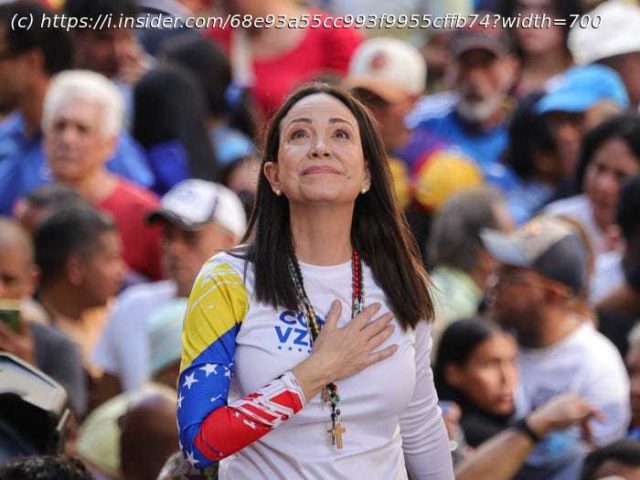Since 1901, the Nobel Peace Prize has been awarding global strides in peace-making. The 2025 winner was announced on October 10.
It’s been 124 years since the first Nobel Peace Prize was handed out to one of the cofounders of the Red Cross and the founder of the first French Peace Society.
Since then, activists, politicians, diplomats, authors, humanitarian organizations, and political prisoners from across the world have been awarded the Nobel Peace Prize.
This year’s winner, María Corina Machado, is the leader of the democracy movement in Venezuela, which is currently under autocratic rule.
Here’s who has won the Nobel Peace Prize every year it has been awarded, from 1901 to 2025.
Shelby Slauer and Melina Glusac contributed to a prior version of this article.1901: Henry Dunant and Frédéric Passy
Dunant and Passy split the very first Nobel Peace Prize between the two of them.
Dunant won for founding the International Committee of the Red Cross in 1863. Passy received the honor for founding the first French Peace Society (Société Française pour l’arbitrage entre nations) in 1878.1902: Élie Ducommun and Charles Albert Gobat
Ducommun mainly won for his work at the International Peace Bureau, at which he served as the honorary secretary-general, but the Nobel Prize website states that, in his spare time, he « prepared programs for international peace congresses, published resolutions, and corresponded with promoters of peace. »
Gobat won « for his efforts to bring popularly elected representatives from various countries together at meetings and congresses. » He also knew Ducommun well — when he died, Gobat took over as the secretary-general for the International Peace Bureau.1903: William Randal Cremer
Cremer was nicknamed the « Master of Arbitration », which is why he received the award. Through his work with the International Arbitration League, he sought to solve conflicts through discussion, not war.1904: Institute of International Law
The Institute of International Law, a nongovernmental organization based in Belgium, received the 1904 Nobel Peace Prize due to its success in persuading countries to use arbitration to deal with conflict, and for convincing countries to accept the rules of law during wartime.1905: Bertha von Suttner
Von Suttner was the first woman to be awarded a Nobel Peace Prize. She won for her work with the Austrian Peace Society, which she established in 1891. She also wrote one of the most influential anti-war novels, « Lay Down Your Arms », in 1889.1906: Theodore Roosevelt
Roosevelt was the first American (and first statesman) to win the award, which he received for negotiating peace treaties in the Russo-Japanese War, ensuring its end in 1905, and resolving a dispute with Mexico using arbitration.1907: Ernesto Teodoro Moneta and Louis Renault
Moneta founded the Lombard Association for Peace and Arbitration in 1887, which believed in disarmament. He also edited the newspaper Il Secolo, which regularly called for pacifism.
Renault was a professor of international law. He spoke at numerous conferences, including two peace conferences at The Hague, where he solidified his place as a prominent figure in the arbitration movement. Renault was also the French government’s advisor in foreign policy and international law.1908: Klas Pontus Arnoldson and Fredrik Bajer
Arnoldson won the Nobel Peace Prize for his efforts to reconcile Norway and Sweden. He also founded the Swedish Peace and Arbitration League.
Bajer founded the Danish Interparliamentary Group in 1891 and was a lifelong believer in peace and arbitration. He’s also been credited with laying the groundwork for the International Peace Bureau.1909: Auguste Beernaert and Paul Henri d’Estournelles de Constant
Beernaert won the Nobel Peace Prize for « inter-parliamentary work and [appearances] at the international peace conferences at the Hague in 1899 and 1907. » He was also the prime minister of Belgium from 1884 to 1894.
D’Estournelles also won the prize in 1909. He was the founder and president of a French parliamentary group for voluntary arbitration, and the founder of the Committee for the Defense of National Interests and International Conciliation.1910: Permanent International Peace Bureau
The International Peace Bureau is a Swiss organization that « campaigned for disarmament and for the use of mediation and arbitration in the solution of international disputes. » It’s still active today with 300 member organizations in 70 countries.1911: Tobias Asser and Alfred Fried
Asser co-founded the Institute of International Law, the first organization to win the Nobel Peace Prize. But it was « his work in the field of private law » that was most important to his win.
Fried co-founded the German Peace Society and founded Die Friedenswarte, a German peace publication.1912: Elihu Root
Root was both the US secretary of war and secretary of state. He was also the first president of the Carnegie Endowment for International Peace.
Root was awarded the prize « for having pursued the aim that conflicts between states must be resolved by arbitration. »1913: Henri La Fontaine
La Fontaine was the first socialist to win the prize — he won for being the « effective leader of the peace movement in Europe. » He was president of the International Peace Bureau and « organized a world conference for international organizations », whose purpose was to « create ‘an intellectual parliament’ for humanity. »1917: International Committee of the Red Cross
The Red Cross was the only recipient of the Nobel Peace Prize during World War I. It won because it « undertook the tremendous task of trying to protect the rights of the many prisoners of war on all sides, including their right to establish contacts with their families. »1919: Woodrow Wilson
Wilson won the prize for founding the League of Nations, which was a dream many previous winners had shared.1920: Léon Bourgeois
Ex-secretary of state and former president of the French parliament, Bourgeois was a major figure in the development of the League of Nations. It was his passion project to see an international court established at The Hague, which he saw through.1921: Hjalmar Branting and Christian Lange
Branting was « a leading figure in the struggle for equal rights and social justice in Sweden » and a strong supporter of the League of Nations.
Lange was also the secretary-general of the Inter-Parliamentary Union and went on to become part of the Nobel Committee in 1934.1922: Fridtjof Nansen
In 1922, Nansen was appointed the first High Commissioner for Refugees, putting him in charge of the exchange of 400,000 prisoners of war. His work on their behalf, as well as on behalf of many starving refugees, won him the prize.1925: Austen Chamberlain and Charles G. Dawes
Chamberlain received his prize for his work on the Locarno Pact, an agreement that saw Germany, France, Belgium, Great Britain, and Italy guarantee peace in western Europe.
US Vice President Dawes, on the other hand, won for « having contributed to reducing the tension between Germany and France after the First World War. »1926: Aristide Briand and Gustav Stresemann
Briand, a professor and founder of the League for Human Rights, and Stresmann, ex-high chancellor and foreign minister, split the award — they both won for their work on the Locarno Pact, which helped ease tension between France and Germany after World War I.1927: Ferdinand Buisson and Ludwig Quidde
French foreign minister Buisson and German professor Quidde, who later became president of the German Peace Society, split the prize evenly — they received it for their contributions to the reconciliation of France and Germany after World War I.1929: Frank B. Kellogg
US Secretary of State Kellogg received the prize for his part in initiating the Kellogg-Briand Pact of 1928, an international agreement that had signatory states promising not to use war to resolve disputes. 1930: Nathan Söderblom
Söderblom was the first clergyman to receive the Nobel Peace Prize. The archbishop and former theology professor is credited with moving the Universal Conference on Life and Work forward, which worked to fight nationalism, racism, and the oppression of minorities.1931: Jane Addams and Nicholas Murray Butler
Addams, an American known as the « mother » of social work, received the honor for founding the Women’s International League for Peace and Freedom and for being an outspoken opponent of entering World War I.
Butler, an American philosopher and diplomat, as well as president of Columbia University and president of the Carnegie Endowment for International Peace, won for « his efforts to strengthen international law and the International Court at the Hague », as well as his support of the Kellogg-Briand Pact of 1928.1933: Norman Angell
Angell remains the only Nobel Peace Prize winner to have won for writing a book — he wrote « The Great Illusion », which explored the relationship between war and any potential national or economic advantage it may bring about. He was also celebrated for his work as an educator and for his support of the League of Nations.1934: Arthur Henderson
British politician Henderson earned the prize for his work with the League of Nations, specifically for being « one of the principal architects behind the organization’s disarmament conference. »1935: Carl von Ossietzky
Ossietzky’s win was inherently political — the German pacifist was arrested for treason when he reported that Germany was secretly rearming itself, explicitly going against the Treaty of Versailles. Part of the international campaign to get him released was awarding him the Nobel Peace Prize.1936: Carlos Saavedra Lamas
Lamas, an Argentine academic and politician, won the prize for three main reasons.
First, he deserves much of the credit for Argentina’s joining the League of Nations. Second, he was important in the League’s « condemnation of Italy’s war on Ethiopia. » Lastly, he was honored for his contributions to peace between Paraguay and Bolivia after the Chaco War.1937: Robert Cecil
English statesman Cecil won the prize for his work with the League of Nations. He was integral to the formation of the organization’s rules.1938: Nansen International Office for Refugees
The Nansen International Office for Refugees won the prize for its work with aiding refugees, specifically for its work with Armenian refugees who were driven out of Turkey.
The organization won 16 years after their namesake, Fridtjof Nansen won as an individual.1944: International Committee of the Red Cross
The Red Cross won its second Nobel Peace Prize for service during World War II.1945: Cordell Hull
Hull, known as the longest-serving secretary of state — he held the position for 11 years — won the prize for his work as the « father of the United Nations », an organization that was founded after World War II.1946: John Mott and Emily Balch
Mott was the head of the Young Men’s Christian Association (the YMCA) and won for contributing « to the creation of a peace-promoting religious brotherhood across national boundaries. »
Balch, an American economist and sociologist known for tackling social issues such as poverty, child labor, and immigration, became a Nobel Laureate for leading the Women’s International League for Peace and Freedom.






